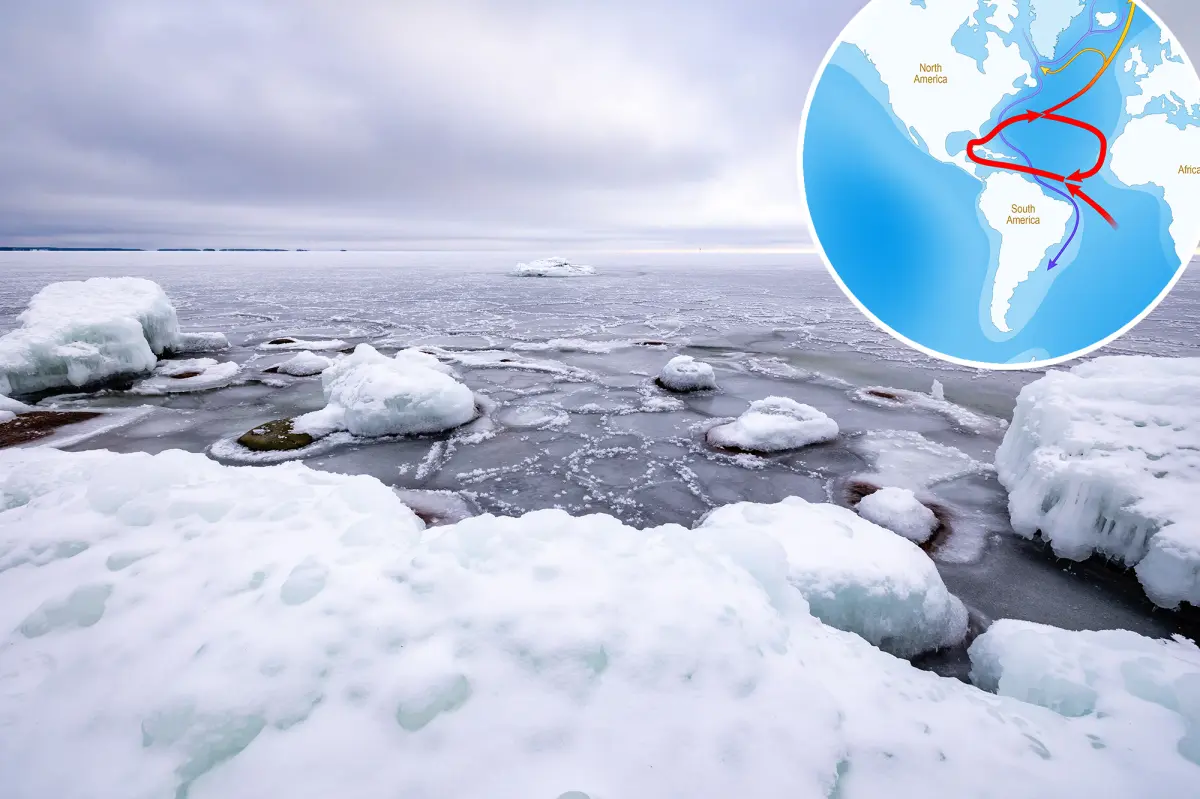Copyright New York Post

These current events don’t look so good. Climate change could push a key Atlantic current to the brink of collapse within decades, potentially fomenting an ice age and raising sea levels, per an apocalyptic study published in the journal Communications Earth & Environment. The apocalyptic study was a collaboration between scientists with the Institute of Oceanology of the Chinese Academy of Sciences (IOCAS) and experts from the University of California, San Diego. Per the research, the at-risk current in question is the Atlantic Meridional Overturning Circulation or AMOC, a “conveyor belt of the ocean” that funnels warm water toward the ocean surface from the tropics to the Northern Hemisphere. This current, which includes the Gulf Stream that runs from the Gulf of Mexico to the US East Coast and across the Atlantic to Europe, helps maintain the mild climate of Europe, the UK, and the US East Coast. Unfortunately, the source of this marine temperature regulator, the Greenland Ice sheet, is being thawed amid warming temperatures fomented by climate change, causing meltwater runoff to leach into the North Atlantic and cause the “Circulation” to stagnate. This has resulted in a “distinctive temperature fingerprint” located some 3,280 to 6,560 feet below the ocean’s surface, the Daily Mail reported. “Here we identify a distinctive temperature fingerprint in the equatorial Atlantic that signals the Atlantic Meridional Overturning Circulation change,” the authors write. “The robust physical mechanism and reliable detection make [this fingerprint] a valuable metric for AMOC monitoring in a warming climate.” This marine hot pocket suggests that the current slowdown has been occurring for decades and could foment a total decline before the end of the century, per the study. In fact, depending on how carbon humans emit over the next few decades, AMOC could begin to collapse in as little as 30 years, LiveScience reported. The researchers reportedly happened upon this warm spot by using the Massachusetts Institute of Technology General Circulation Model (MITgcm) — a computer model that simulates the ocean, atmosphere and climate — to monitor how “AMOC-related signals” like energy waves ripple rapidly toward the equator. The AMOC slowdown prompts subsurface warming in the subpolar North Atlantic – the region between the subtropics to the south and the Nordic Seas to the north — generating energy waves that travel along the Western North Atlantic toward the equator. When they hit home, they multiply along the equatorial region, effectively creating this oceanic hotspot. By examining observational data dating back to 1960, the research team discovered that the mid-depth warming trend that spiked in the late 2000s, indicating that the AMOC’s decline began in the late 20th century. Should the AMOC slow down too much, it could have catastrophic ramifications. These include — somewhat paradoxically — causing temperatures across Europe to plummet by nearly 60 degrees, cancelling out warming created by human activity. “Winters would be more typical of Arctic Canada and precipitation would decrease, also,” Jonathan Bamber, a professor of Earth observation at the University of Bristol, told the Daily Mail. “Very harsh, cold winters would certainly be a threat to life.” Coincidentally, the last time the AMOC collapsed was before the last Ice Age that ended about 12,000 years ago, Reuters reported. Meanwhile, previous models have suggested that the phenomenon would negatively impact the tropical rain belt on which millions rely for agriculture, and tack on 50cm to already rising sea levels, the Guardian reported. The situation is so dire that Iceland designated the AMOC’s potential collapse a national security threat. “It is a direct threat to our national resilience and security,” Iceland Climate Minister Johann Pall Johannsson said by email. “(This) is the first time a specific climate-related phenomenon has been formally brought before the National Security Council as a potential existential threat.” Unfortunately, the extent of the consequences on human civilization remains unclear. “There is tons of research on the likelihood of when exactly things are going to happen,” said Aleksi Nummelin, a physical oceanographer at the Finnish Meteorological Institute. “There is much less on what is the actual societal impact.”



